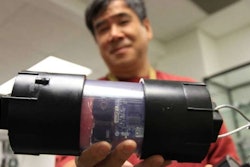CLAREMONT, N.C. (AP) — Bunker Hill High students recently got hands-on with their education and an up-close look at some practical STEM (science, technology, engineering, mathematics) related skills.
Science teacher Tricia Rushing invited Summer Cortinas, a scientist from BioNetwork, to visit her anatomy class and teach the students how to detect the Zika virus.
They learned how to analyze a patient sample for evidence of Zika in an enzyme-linked immunosorbent assay (ELISA) simulation based on the protocol used by Centers for Disease Control epidemiologists.
"I like for my students to see a real scientist," Rushing said. "We read scientific studies and talk about scientists of the past, so it's good for them to get more exposure instead of me just being a teacher telling them about scientists, they actually get to see it."
She said this kind of experience is a good review for them as well and gives them a chance to use new equipment and relate it back to other projects they're working on in the classroom.
Rushing has invited BioNetwork to her class every semester for three years. Along with her anatomy class, Cortinas worked with Rushing's biology classes.
The students learned about the basic structure of cells and deoxyribonucleic acid (DNA) as they extract DNA from their own cheek cell. Cortinas discussed potential applications for DNA extraction as well.
DNA is the hereditary material in humans and almost all other organisms, according to the U.S. National Library of Medicine website.
All of Rushing's students delved into the world of tiny volumes and gained hands-on experience using micropipettors. They learned how to pipette different microliter volumes with accuracy and precision.
"Our goal is to inspire future STEM employees. We want kids to get excited about science," Cortinas said.
BioNetwork was established in 2004 through funding from the Golden LEAF Foundation. It was charged with addressing the growing education and training needs of the state as it transitioned from a traditional manufacturing economy to a high-tech, skill-intensive biomanufacturing economy, according to ncbionetwork.org.
"We we want to make (students) aware that they don't have to go to school forever to be a scientist," Cortinas said. "They can get a real solid STEM job with a one-year or two-year degree."
From 2001 to 2012, the life science industry rose in North Carolina 30.9 percent compared to 1 percent for total private sector employment in North Carolina, according to a report at digital.ncdcr.gov. In employment, the total economic impact from the life science industry stands at 228,259 jobs.
Fun is part of the experience as well, Cortinas said.
"We make sure they're doing something gross or cool or learning about this neat equipment," she said. "We always provide PPE (personal protective equipment) for them to wear like gloves and goggles because that makes them feel more authentic."
Rushing said she saw students in her biology class who usually don't feel excited about science get excited about their DNA experiment.
"Maybe that's a student who doesn't enjoy bookwork or worksheets but when they get to do something hands on, they see that maybe science is OK," Rushing said.
Bunker Hill High senior Caroline Hilliard was one of those students who is already a fan of science. She was in the anatomy class learning how to detect Zika.
"I take more science classes than I have to," Hilliard said. "I plan on majoring in exercise science and then hopefully going on to physical therapy, so a lot of this I will be using."
She thinks the hands-on experience in class helps her understand what a procedure is really like rather than just hearing about it.
"It's more fun to actually do something," Hilliard said.
For her, watching the reaction when they mixed ingredients was the most exciting moment in her class's experiment.
Fellow senior Harley Tremain was equally excited to learn how to use the micropipettor in the anatomy class and said science is his favorite subject.
"I enjoyed learning about how people look at diseases, and how scientists figure out what they need to do, how they need to combat it," Tremain said.
He wants to get a degree in the health field, so he said the experience BioNetwork brought to the class might put him a step ahead or give him the skills to know what he's doing a little better than other students.
"There's science in everything. Every day you use science, so it's fun to figure out how stuff works in your body and in the world," Tremain said.
For more information about BioNetwork visit ncbionetwork.org.






















